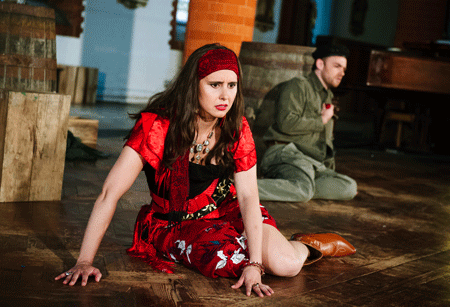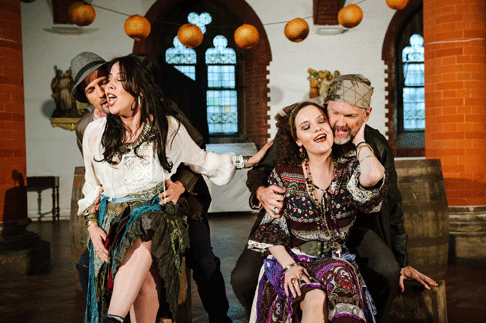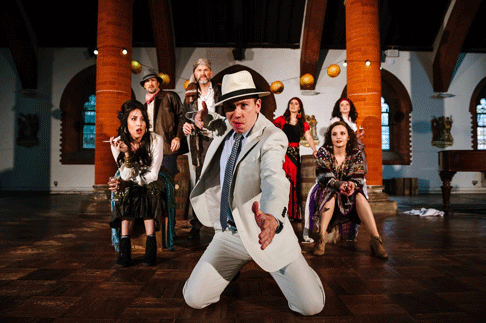Recently in Performances
English Touring Opera are delighted to announce a season of lyric monodramas to tour nationally from October to December. The season features music for solo singer and piano by Argento, Britten, Tippett and Shostakovich with a bold and inventive approach to making opera during social distancing.
This tenth of ten Live from London concerts was in fact a recorded live performance from California. It was no less enjoyable for that, and it was also uplifting to learn that this wasn’t in fact the ‘last’ LfL event that we will be able to enjoy, courtesy of VOCES8 and their fellow vocal ensembles (more below …).
Ever since Wigmore Hall announced their superb series of autumn concerts, all streamed live and available free of charge, I’d been looking forward to this song recital by Ian Bostridge and Imogen Cooper.
Although Stile Antico’s programme article for their Live from London recital introduced their selection from the many treasures of the English Renaissance in the context of the theological debates and upheavals of the Tudor and Elizabethan years, their performance was more evocative of private chamber music than of public liturgy.
Evidently, face masks don’t stifle appreciative “Bravo!”s. And, reducing audience numbers doesn’t lower the volume of such acclamations. For, the audience at Wigmore Hall gave soprano Elizabeth Llewellyn and pianist Simon Lepper a greatly deserved warm reception and hearty response following this lunchtime recital of late-Romantic song.
For this week’s Live from London vocal recital we moved from the home of VOCES8, St Anne and St Agnes in the City of London, to Kings Place, where The Sixteen - who have been associate artists at the venue for some time - presented a programme of music and words bound together by the theme of ‘reflection’.
'Such is your divine Disposation that both you excellently understand, and royally entertaine the Exercise of Musicke.’
‘And there was war in heaven: Michael and his angels fought against the dragon; and the dragon fought and his angels, And prevailed not; neither was their place found any more in heaven … that old serpent … Satan, which deceiveth the whole world: he was cast out into the earth, and his angels were cast out with him.’
There was never any doubt that the fifth of the twelve Met Stars Live in Concert broadcasts was going to be a palpably intense and vivid event, as well as a musically stunning and theatrically enervating experience.
‘Love’ was the theme for this Live from London performance by Apollo5. Given the complexity and diversity of that human emotion, and Apollo5’s reputation for versatility and diverse repertoire, ranging from Renaissance choral music to jazz, from contemporary classical works to popular song, it was no surprise that their programme spanned 500 years and several musical styles.
The Academy of St Martin in the Fields have titled their autumn series of eight concerts - which are taking place at 5pm and 7.30pm on two Saturdays each month at their home venue in Trafalgar Square, and being filmed for streaming the following Thursday - ‘re:connect’.
The London Symphony Orchestra opened their Autumn 2020 season with a homage to Oliver Knussen, who died at the age of 66 in July 2018. The programme traced a national musical lineage through the twentieth century, from Britten to Knussen, on to Mark-Anthony Turnage, and entwining the LSO and Rattle too.
With the Live from London digital vocal festival entering the second half of the series, the festival’s host, VOCES8, returned to their home at St Annes and St Agnes in the City of London to present a sequence of ‘Choral Dances’ - vocal music inspired by dance, embracing diverse genres from the Renaissance madrigal to swing jazz.
Just a few unison string wriggles from the opening of Mozart’s overture to Le nozze di Figaro are enough to make any opera-lover perch on the edge of their seat, in excited anticipation of the drama in music to come, so there could be no other curtain-raiser for this Gala Concert at the Royal Opera House, the latest instalment from ‘their House’ to ‘our houses’.
"Before the ending of the day, creator of all things, we pray that, with your accustomed mercy, you may watch over us."
The doors at The Metropolitan Opera will not open to live audiences until 2021 at the earliest, and the likelihood of normal operatic life resuming in cities around the world looks but a distant dream at present. But, while we may not be invited from our homes into the opera house for some time yet, with its free daily screenings of past productions and its pay-per-view Met Stars Live in Concert series, the Met continues to bring opera into our homes.
Music-making at this year’s Grange Festival Opera may have fallen silent in June and July, but the country house and extensive grounds of The Grange provided an ideal setting for a weekend of twelve specially conceived ‘promenade’ performances encompassing music and dance.
There’s a “slide of harmony” and “all the bones leave your body at that moment and you collapse to the floor, it’s so extraordinary.”
“Music for a while, shall all your cares beguile.”
The hum of bees rising from myriad scented blooms; gentle strains of birdsong; the cheerful chatter of picnickers beside a still lake; decorous thwacks of leather on willow; song and music floating through the warm evening air.
Performances

08 Jul 2017
Dulwich Opera’s Carmen
Dulwich Opera Company’s Carmen was a convincingly successful show. This was mainly due to succinct musical direction and rigorous dramatic direction. It also meant that the proximity of the action was a fascinating treat, and by the artists being young, and easy on the eye.
Despite being in a functioning school hall in south London, with a minimal set, dodgy lighting, and done on the proverbial shoe-string, it still managed to transport us into a languid, sun-soaked Mediterranean. Added to which Phillipa Thomas is the best Carmen I’ve seen since Maria Ewing in the Peter Hall production at Glyndebourne in the ‘80’s. While Ewing had a breath-taking stillness about her, Thomas brings an innocence to the role.
In his programme notes the director Ptolemy Christie writes that the original Carmen in Prosper Merimee’s book was ‘vicious, intoxicating, ruthless, double-crossing and dark. She’s bad news. In the opera she is also vicious and of course intoxicating but she is also a creature of humour and light.’ Phillipa Thomas came onto the stage with a huge, slightly naughty smile on her face — she was going to enjoy herself, and who can blame her when she’s nailed this role so well, and evidently has a good time singing it (even with an announced but imperceptible cold). She allows the role to develop, initially a curious pretty alley cat at her first meeting with Don Jose when she throws him the flower — she knows she fancies him and wants to play with him. She allows her character to unravel and when her smuggling mates go off to the mountains, her happiness at being in love with Don Jose is genuine. Even in the final act when she’s trying to get past Don Jose, the music is uncertain and although her heart is hardened against him, Carmen mirrors this, at the same time showing that’s she’s moved on. This Carmen doesn’t shake her booty but celebrates it. She has no inhibitions on stage, she’s a stage animal and she inhabits her role — one to keep a sharp eye on.
 Caspar James (Le Dancaïre), Claudia Haussmann (Frasquita) Urszula Bock (Mercedes), Jeremy Vinogradov (Le Remendado)
Caspar James (Le Dancaïre), Claudia Haussmann (Frasquita) Urszula Bock (Mercedes), Jeremy Vinogradov (Le Remendado)
This luxury Carmen casting wouldn’t have worked had it not been for the production around her which used what they didn’t have to their advantage; at the beginning of Act 11, Frasquita and Mercedes gathered round the upright piano in the Lillas Pastia Bar giving a seedy image, and in the mountain scene, the cards were clearly visible when Carmen sees death in them. Christie also got round the crown scene outside the bullring in Act 4 without a crowd. He placed the focus solely on Carmen and Escamillo, the extent of their love and put them in gorgeous eye-pleasing costumes. This in turn made Don Jose’s entrance and the last scene more menacing and powerful. Christie also injected energy into the production and cast; Carmen as a piece is an onslaught of emotions and this cast didn’t shy away from that — they were believable. James Hutching’s Don Jose looks like a young boy and plays the role with acute vulnerability - his Flower Song was real tear jerker. He coped well vocally although this role is a big sing for him. Loretta Hopkins looked like a mixture between a NHS nurse and a milkmaid, a good combination for Micaela while David Fletcher was an aptly oily Escamillo, but vocally this isn’t his role. Credit should go to the rest of the cast for their energetic back-up.
 Claudia Haussmann (Frasquita), Caspar James (Le Dancaïre), Jeremy Vinogradov (Le Remendado), David Fletcher (Escamillo), Phillipa Thomas (Carmen), Urszula Bock (Mercedes)
Claudia Haussmann (Frasquita), Caspar James (Le Dancaïre), Jeremy Vinogradov (Le Remendado), David Fletcher (Escamillo), Phillipa Thomas (Carmen), Urszula Bock (Mercedes)
The sight of a little black upright piano for Carmen was daunting but fears were soon aligned. The music director Jeremy Silver kept the show on course, the tempo never lagged, and legato passagios were emotively spun out. With the invisible cuts, this was a compulsive and enjoyable show.
Louise Flind


